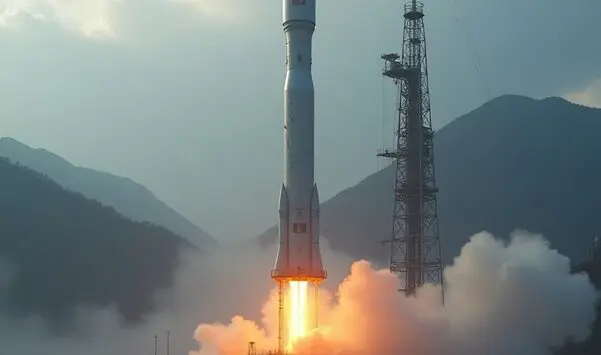- DETERRENCE: U.S. sees China launch as test of anti-satellite muscle
- DPRK: Heads (of State) Xi Jinping and Obama hold their second meeting
- ENERGY SECURITY: US-China climate deal seen as first step
- GOVERNANCE AND CIVIL SOCIETY: Northeast Asia needs non-traditional teamwork
- CLIMATE CHANGE ADAPTATION: Heavy weather: climate and the Australian Defence Force
- AUSTRAL PEACE AND SECURITY: Japan’s emerging amphibious capability
 DETERRENCE: U.S. sees China launch as test of anti-satellite muscle, Andrea Shalal-Esa, Reuters (15 May 2013)
DETERRENCE: U.S. sees China launch as test of anti-satellite muscle, Andrea Shalal-Esa, Reuters (15 May 2013)
China fired a rocket 10000 km above Earth from Xichang Satellite Launch Center. China said its payload was to study the earth’s magnetosphere. A US official said: “It was a ground-based missile that we believe would be their first test of an interceptor that would be designed to go after a satellite that’s actually on orbit.”
- Pentagon continues use of China satellite in new lease, Tony Capaccio, Bloomberg News (15 May 2013)
- China’s U.S. debt holdings aren’t threat, Pentagon says, Tony Capaccio, Daniel Kruger, Bloomberg News (11 September 2012)
DPRK: Heads (of State) Xi Jinping and Obama hold their second meeting, Yao Da and Wei She, People’s Daily (10 June 2013) [Chinese language]
North Korea likely continues to see limited options in the international environment. Presidents Obama and Xi agreed in American press – but not in Chinese press – that North Korea must denuclearize. The Koreas held extensive working level discussions with no final outcome. North Korean bureaucratic politics likely continue to exist as explained in “Inside the Red Box”. The talks were likely useful for determining concessions South Korea may offer.
- Obama, Xi agree North Korea must denuclearize, American Forces Press Service (9 June 2013)
- South Korea: Talks with North scrapped over negotiators, The New Zealand Herald (12 June 2013)
- North Korea contingency planning and U.S.-ROK cooperation, Center for U.S.-Korea Policy (September 2009) [PDF, 620KB]
ENERGY SECURITY: US-China climate deal seen as first step, Sydney Morning Herald (12 June 2013)
An occasion to weep, to laugh, to remember that we are not living in Rio any more, to wonder when the 21 year old child called FCCC is going to grow up and move out. If this is a first step, it is only so for a “beginning of a new relationship” between two foes at the threshold of a new cold war. They have agreed to agree that all other nations will negotiate to add HFCs to the Montreal Protocol. That may be beginning of the end for the FCCC. In the meantime, more fossil fuels are found and may keep on turning up. The new slogan? “Dig out, blow out; emit, damnit.”
- Shale oil ‘adds 11% to world reserves’, BBC News (10 June 2013)
- What if we never run out of oil? Charles C. Mann, The Atlantic (24 April 2013)
- We may live on a natural gas machine, Matt Ridley, Wall Street Journal (8 June 2013) [Subscription required]
GOVERNANCE AND CIVIL SOCIETY: Northeast Asia needs non-traditional teamwork, Tao Yu, China.org.cn (11 June 2013)
 The ongoing challenges of security relations between Northeast Asian countries may be improved by fostering engagement in non-traditional areas such as environmental protection and inter-country NGO relationships. Traditional security ties continue to take center-stage, however, with inter-Korea talks breaking down, pledged increased military cooperation between China and the ROK and seemingly increasing anti-Korean sentiment in Japan.
The ongoing challenges of security relations between Northeast Asian countries may be improved by fostering engagement in non-traditional areas such as environmental protection and inter-country NGO relationships. Traditional security ties continue to take center-stage, however, with inter-Korea talks breaking down, pledged increased military cooperation between China and the ROK and seemingly increasing anti-Korean sentiment in Japan.
- Inter-Korean talks called off over delegation leader rank disagreements, Kang Tae-ho, Hankyoreh (12 June 2013)
- Analysis: China, S. Korea have different reasons to strengthen military cooperation, Asahi Shimbun (5 June 2013)
- Inside Japan’s growing xenophobic right-wing, Jeong Nam-ku, Hankyoreh (9 June 2013)
CLIMATE CHANGE ADAPTATION: Heavy weather: climate and the Australian Defence Force, Special report, Anthony Press, Anthony Bergin and Eliza Garnsey, APSI (2013)
The 2009 Australian Defence White Paper dismissed climate change as an issue for future generations, judging that the strategic consequences wouldn’t be felt before 2030. But that’s no longer the case. Due to the growing importance of climate change to broad security interests, the Australian Defence Force should consider the implications of climate change and should develop strategies to ensure it can contribute to any necessary response.
- Climate security, risk assessment and military planning, Chad Michael Briggs, International Affairs, vol. 88, no. 5 (2012) [subscription required]
- Climate change, human security and violent conflict, Jon Barnett and W. Neil Adger, Political Geography, vol. 26 (2007) [135 KB, PDF]
AUSTRAL PEACE AND SECURITY: Japan’s emerging amphibious capability, Benjamin Schreer, The Strategist, ASPI (5 June 2013)
The GSDF and MSDF are taking cooperation with the US Marines to a new level. Japan will send three of its largest and most modern warships, 250 ground troops and combat helicopters to participate in the amphibious exercise Dawn Blitz 2013 off the coast of Southern California later this month, alongside the US, Canada and New Zealand (!). It will also increase cooperation between the GSDF and the MSDF which is still underdeveloped.
- Japanese soldiers debut in live firing exercise in Australia, Xinhua (30 May 2013)
- A new carrier race? Strategy, force planning, and JS Hyuga, Yoji Koda, Naval War College Review, Vol. 64, No. 3 (2011)
- Assessing Japan’s national defense: toward a new security paradigm in the Asia-Pacific, Ian Easton and Randall Schriver, Project 2049 Institute (3 June 2013) [PDF, 1.45MB]
The Nautilus Peace and Security Weekly Report presents articles and full length reports each week in six categories: Austral security, nuclear deterrence, energy security, climate change and security, the DPRK, climate change adaptation and governance and civil society. Our team of contributors carefully select items that highlight the links between these themes and the three regions in which our offices are found—North America, Northeast Asia, and the Austral-Asia region. Subscribe to NAPSNet to receive free weekly email reports Editor
Contributors
- Deterrence: Peter Hayes
- Governance and Civil Society: Dyana Mardon
- Climate Change Adaptation: Saleem Janjua
- DPRK: Roger Cavazos
- Energy Security: Nikhil Desai
- Austral Peace and Security: Richard Tanter


